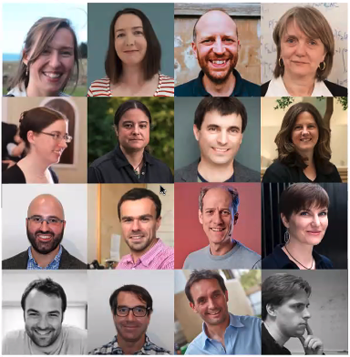One of our earliest COVID memories is talking to epidemiologist Julia Gog in mid-March last year. "Life is not going to be the same for a long time," Gog said back then, pointing to the potential death toll and multiple lockdowns for months, or years, to come. It was then that the gravity of what was about to unfold began to dawn on us.

JUNIPER principal and co-investigators. Left to right and top to bottom: E. Brooks-Pollock, H. Christensen, L. Danon, D. De Angelis, L. Dyson, G. Gog, I. Hall, D. Hollingsworth, T. House, C. Jewell, M. Keeling, P. Klepac, TJ McKinley, L. Pellis, J. Read, M. Tildesley. See this list for affiliations.
Nearly one year later, we have worked on multiple articles with Gog and her colleagues, and are now proud to announce a collaboration with some of the best minds in epidemiology in the country. The Joint Universities Pandemic and Epidemiological Research modelling consortium (JUNIPER), which Gog helped to form, comprises 16 academics from the universities of Cambridge, Warwick, Bristol, Exeter, Oxford, Manchester, and Lancaster. They are using a range of mathematical and statistical techniques to address pressing questions about the control of COVID-19.
JUNIPER members represent experienced research groups from these universities that have been generating predictions, forecasts and insights feeding into the Scientific Pandemic Influenza Group on Modelling (SPI-M) and the Scientific Advisory Group for Emergencies (SAGE), both of whom advise the UK government on scientific matters relating to the UK's response to the pandemic. Members continue to respond to rapid requests from the UK government via SPI-M and SAGE. This includes providing weekly forecast of the reproductive number R and growth rate of COVID-19 in the UK and predictions of the effect interventions have on the spread of the disease.
Plus's job in the collaboration with JUNIPER is to communicate the work of JUNIPER members to the general public, policy makers, and whoever else wants or needs to know. As JUNIPER has been coming together over the last few months we already started on this work. You can see a list of existing articles produced in collaboration with JUNIPER members below. We'll be continually reporting on JUNIPER activities (and update the content on this page), and we're particularly looking forward to JUNIPER's first research meeting on February 23. The meeting is free for anyone to attend, if you are interested then please register here.
"I can already see how brilliantly JUNIPER is working together; how many collaborations are emerging," says Gog. "What we are doing is turbo-charged." One aim of JUNIPER is to react to current issues relevant to COVID-19, such as vaccines, new strains of the virus, or new data sets becoming available. "But JUNIPER also allows us to be a little more forward-looking," says Gog. "As academic modellers we can see topics on the horizon that are still three or four months from [becoming relevant], but are really important, so we need to start work on them right now." As well as focussing on the current pandemic, JUNIPER also aims to help train the next generation of mathematicians to build the UK’s capacity for future epidemics and pandemics.
"Communicating what we do to non-expert audiences, be they policy makers, civil servants, or the general public, is a key part of JUNIPER's work," says Matt Keeling, who is Principal Investigator on JUNIPER along with Gog. "By integrating the collaboration with Plus in JUNIPER from the outset we are making sure we achieve that goal. We are very excited about working with Plus."
Here at Plus we are honoured to be able to contribute to JUNIPER. In the many years we have been editing Plus, it's never seemed as important as now to communicate mathematical concepts to as broad an audience as possible.
Julia Gog is Professor of Mathematical Biology at the University of Cambridge. Matt Keeling is Professor at the University of Warwick, holding a joint position in Mathematics and Life Sciences. He is also the current director of the Zeeman Institute for Systems Biology and Infectious Disease Epidemiology Research. Both are Principal Investigators on Juniper, members of the modelling group SPI-M and contributors to SAGE.

Content produced so far in collaboration with JUNIPER
See this page for an updated list of JUNIPER articles and podcasts.
On the mathematical frontline: Julia Gog —What's it like advising government on the maths behind COVID-19? Find out with epidemiologist Julia Gog in this new podcast series.
Careful with your Christmas b(a)ubbles —Modelling shows that your choice of how many households you bubble with this Christmas can make a real difference to the spread COVID-19.
The COVID-19 vaccines: Your questions answered — Are they safe? Are they effective? Will they stop the pandemic? Find out with our FAQ informed by experts.
What's the price for relaxing the rules? — After weeks of tight restrictions we are all longing to go into a lower tier, but this can come at a high price later on.
The growth rate of COVID-19 — We all now know about R, the reproduction number of a disease. But sometimes it can be good to consider another number: the growth rate of an epidemic.
The problem with combining R ratios — We explore why you need to be extremely careful when combining the reproduction ratios of a disease in different settings, such as hospitals and the community.
How can maths fight a pandemic? — How do mathematical models of COVID-19 work and should we believe them? We talk to Julia Gog, an epidemiologist who has been working flat out to inform the government, to find out more.